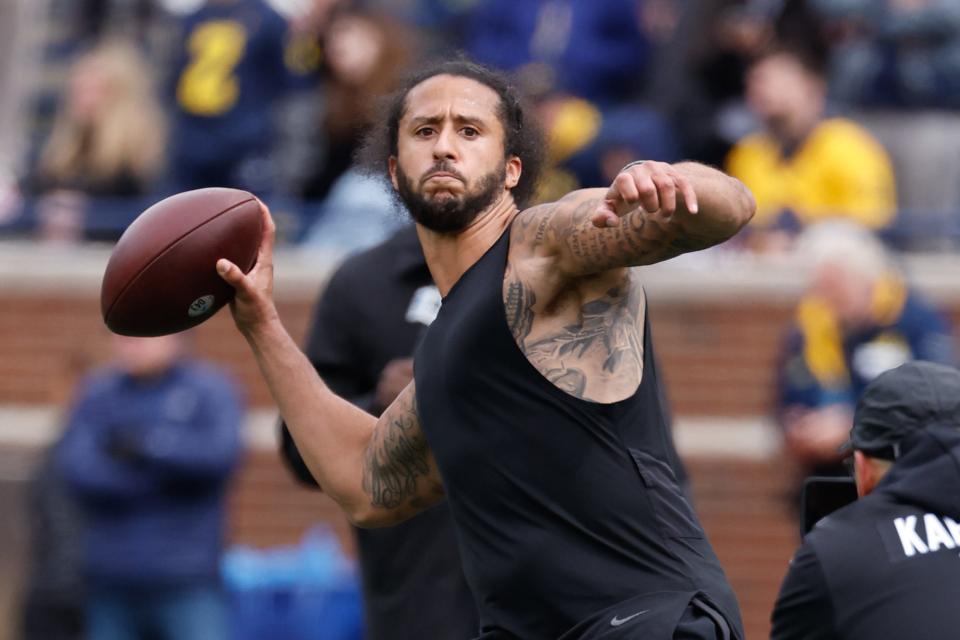New Colin Kaepernick documentary brings nuance to his protests that was missing in moment | Opinion
The most powerful scene in the new “Kaepernick & America” documentary doesn’t even feature Colin Kaepernick.
Thirty minutes into the 80-minute film, the shooting death of Philando Castile by police officers during a July 2016 traffic stop is shown in graphic detail. First is dashcam footage of the stop, which turns deadly in astonishingly quick fashion. Then footage of Castile’s lifeless body, his white T-shirt stained red by his blood.
“You shot four bullets into him, sir,” Castile’s distraught girlfriend is heard saying. “He was just getting his license and registration, sir.”
The violence of the scene is jarring. You see the officer draw his weapon, without provocation, and fire into the car repeatedly. You hear the gunshots and the screams of Castile’s girlfriend. But it is the rawness of the brutality that’s the point, co-director Tommy Walker told USA TODAY Sports.
“Often, as we look at these events, we end up compartmentalizing them and we don’t connect them. That’s one of the things we wanted to do with the film was connect these pieces together,” Walker said. “We went round and around about it. It was not an easy decision to decide to show the graphic images we did … but we do feel as though it’s something we all need to see in order for us to recognize the severity of the moments that happened, the tragedies that happened.
“These kinds of things stay with you. You remember it. … You have to show people the realities and truths of what happened.”
Six years after Kaepernick first took a knee to protest police brutality of Black and brown people, inspiring a movement and inflaming much of the nation, it might seem as if there is nothing left to be said. While polls have shown a growing acceptance for athlete protests, the NFL has all but erased the former San Francisco 49ers quarterback, and Kaepernick himself remains largely silent.

But “Kaepernick & America” shows there are conversations left to be had. Maybe not about Kaepernick, but about America, and what the reactions to his protests – then and now – say about our fractured nation.
OPINION: Colin Kaepernick continues coloring outside the lines, but is NFL career over?
MORE: Colin Kaepernick's partner, Nessa, announces on Instagram the birth of their first child
The film begins streaming on demand Friday. Directed by Walker and Ross Hockrow, it features interviews with the NFL Network’s Steve Wyche, the first to report on Kaepernick’s protest; Nate Boyer, the former NFL player and Green Beret whose initial criticism convinced the quarterback to kneel rather than sit; Jim Harbaugh, Kaepernick’s coach with the 49ers; April Dinwoodie, an expert on transracial adoptions; and DeRay McKesson, a civil rights activist.
“I don’t think this film is judgmental,” Wyche said. “They did a really good job of taking you to what this journey has led us to now. The breadcrumbs have led somewhere, and they do a really good job of exposing that.”
The documentary interweaves Kaepernick’s history, personal and professional, and the anger and resentments that have always existed but were given full throat by the 2016 election. It shows how the mischaracterization of what Kaepernick was protesting – it was never about the military or the flag or even the anthem – hardened opinions when what he was trying to do was start a conversation.
But by having the benefit of hindsight, shaped by the rise of white nationalism under former President Donald Trump and the 2020 murder of George Floyd, the film allows for a nuance that was impossible in the moment.
“(After Floyd’s murder), a lot of people, they either doubled down against things that Colin Kaepernick was saying or Colin himself,” Boyer said. “But I think more people softened or took a step back and said, 'OK, maybe I thought I was listening and wasn’t,’ or 'Maybe I wasn’t listening in the right way,’ or 'Maybe I was being ignorant because this is pretty blatant.’
“Without Colin, there’s less of a chance that what happened to George Floyd and the aftermath has that type of impact.”
The movie offers no storybook ending or judgment about Kaepernick’s place in history, and it is not intended to. Kaepernick’s protest and the reasons for it are complex, as are the angry reactions it generated.
What Walker and Hockrow hope is that people will come away from the film with a better understanding of the America that created both.
“This all happened at a crazy time in the country,” Hockrow said. “This film is meant for, once you’re done, now you’re ready to have a conversation rather than trying to draw from memory of certainly the craziest time in my memory.
“It’s to further the conversation, which is what he was trying to do.”
Follow USA TODAY Sports columnist Nancy Armour on Twitter @nrarmour.
This article originally appeared on USA TODAY: Kaepernick's protests benefit from nuanced take in new documentary

